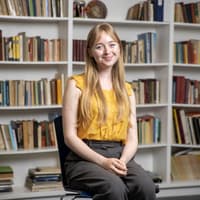Sara Ahlich
Sara Ahlich participated in the 2022 CLS Spark for Russian hosted by American Councils for International Education in Tbilisi, Georgia and the 2023 CLS Russian Program hosted by the American University of Central Asia in Bishkek, Kyrgyzstan. Sara is a senior at University of California, Berkely where she studies Conservation and Resource Studies. Sara plans to apply her Russian skills to connect with rural communities as she studies traditional uses of plants in the Russian-speaking world.
Why Study Russian?
One of my favorite books is set in Russia during WWII. While I was drawn in immediately by the historical and cultural context, it was the personalities and growth of the characters that really stuck with me. I realized that I had internalized the idea that Russian (and Russian speaking) people and cultures were cold and stoic, and the complexity of the characters confronted these stereotypes. As I began to look more into Russian culture, I discovered a fascinating world that I was missing out on, and I decided that learning Russian would be the best way to further explore it!
A Favorite Phrase in Russian
It’s very simple, but currently my favorite phrase is “Я люблю тебя” – “I love you”. I had a young host sister who talked so fast that I usually could not keep up. While our communication was limited, she would pop into my room to paint, watch videos, or create an obstacle course. A few weeks in, she hugged me and said “Я люблю тебя” – not only was it a very sweet moment, but it also was one of the first things I could understand from her!
Why Should Others Learn Russian?
Russian is a lot different than other languages I have studied. Learning Russian has been a more challenging journey, but an equally rewarding one. While the grammar can feel like a slog, I try to think of it more like a puzzle – I know the pieces fit because millions of people have learned to speak it, so it’s a matter of orienting the pieces in a way that makes sense to me. I think that because Russian is so different to me, each time I can use a new case or understand a new phrase it’s a cause for celebration, which motivates me to continue.
Art and Environmental Activism in Bishkek
I had an amazing language partner who went above and beyond to make me feel at home in Bishkek. In addition to language practice, she became both a guide and a friend as she helped me learn to navigate a new language and culture. One of the most memorable experiences that we shared was an eco-arts fair, which introduced me to both the art scene and environmental activism in Bishkek. Not only was it fun to participate in a local event, but also inspiring to see that my passion and concern for the environment is shared across the world.
Connecting with Rural Communities
When I began my Russian studies, I wasn’t completely certain how I would link my environmental science based major and my interest in language and culture. However, I quickly learned that the relationship between language, culture, and the environment is greatly underappreciated. I am interested in studying the traditional uses of plants in the Russian-speaking world, which requires strong linguistic and cultural competencies to communicate with rural communities.
The Right Fit
I remember being hesitant to apply to CLS Spark because I didn’t feel that I fit my idea of an ideal applicant: I was a community college student that didn’t have super clear direction, and I didn’t have strong ties to my target language. I’ve since learned that CLS seeks to strengthen their cohorts by encouraging students from different cultural, academic, and socioeconomic backgrounds to apply. I would encourage anyone to apply, even if you don’t think your experiences or background seems to fit the bill – your perspective may be just what they’re looking for!
Words of Advice
While the essays may be intimidating, they are short! Try to take full advantage of each essay by cutting out anything generic – each sentence should be unique to you and help further the readers understanding of your motivations. Also… just apply! If you are intimidated by the application, try your best to answer everything authentically to you and submit – don’t reject yourself before you give yourself a chance. Similarly, if the thought of spending two months abroad is scary, try to find reasons to be excited – after all, two months goes by quickly once you’re there, and I bet you’ll even be sad to go home!
Alumni Profiles

Russian 2023
Bishkek, Kyrgyzstan
Posted Date
September 30, 2024


